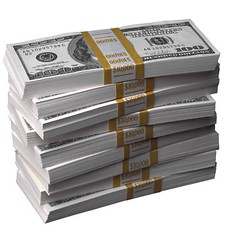- The Festival of Frugality #278 The Pure Peer Pressure Edition is up. All of your friends are reading it. http://bit.ly/aqkn4K #
- RT @princewally: Happy StarWars Day!: princewally's world http://goo.gl/fb/rLWAA #
- Money Hacks Carnival #114 – Hollywood Edition http://bit.ly/dxU86w (via @nerdwallet) #
- I am the #1 google hit for "charisma weee". Awesome. #
Beat the Check

- Image via Wikipedia
Have you ever played a game of “Beat the Check”? Your rent is due tomorrow, but you don’t get paid until Friday, so you write the check today an, on payday, you run to the bank to get your paycheck deposited before it has a chance to clear. To stretch out the time, you write yourself a check from another account to cover the deficit, knowing that will take a few more days to clear. This is called “floating” a check.
Sound familiar?
I think most people who write checks have tried to rush a deposit in before a check clears.
In 2004, the Check 21 act went into effect, which turned the game on its head. This law gave check recipients an option to make a digital copy of a check, slashing processing time. Instead of boxes of checks being transported around the country, the check began getting scanned and instantly transferred, along with all of the encoding necessary to keep the digital checks organized. This dramatically cut the amount of time it took to clear a check. What was once a week was reduced to as little as 48 hours.
Now, as technology improves and banks update their infrastructure to match, the “float” time has been reduced even further. Many banks are using image control systems to instantly convert all incoming checks to digital format. Within a couple of hours, these images can be transmitted to the Federal Reserve, to be transmitted nearly instantly to the issuing bank. If both the issuing and the receiving banks are using modern image control systems, it is impossible to float a check. “Beat the Check” is a thing of the past. It’s like betting on purple at the roulette wheel.
Of course, this doesn’t mean that the funds are instantly available. That would eliminate the banks being able make use of the funds during that time. Don’t expect the banks to make a habit of allowing you the use of your money before the federal regulations demand it.
Twitter Weekly Updates for 2010-07-17
- RT @mymoneyshrugged: The government breaks your leg, and hands you a crutch saying "see without me, you couldn't walk." #
- @bargainr What weeks do you need a FoF host for? in reply to bargainr #
- Awesome tagline: The coolest you'll look pooping your pants. Yay, @Huggies! #
- A textbook is not the real world. Not all business management professors understand marketing. #
- RT @thegoodhuman: Walden on work "spending best part of one's life earning money in order to enjoy (cont) http://tl.gd/2gugo6 #
Check Your Bills
Today, I discovered our AOL billing information. Turns out we’ve been paying for dial-up via automatic bill paying that we thought we cancelled in 2000. $1,800 later, we called to cancel. Customer service congratulated us on being loyal members for over 13 years. FML -Jay

- Image by roberthuffstutter via Flickr
I am a huge fan of automating my finances. My paycheck is direct-deposited. My savings are automatically transferred from my checking account to my savings account. Almost every bill I receive regularly is set up as an automatic payment in my bank’s bill-pay system. I even have my debt snowball automated.
The only question left is whether it’s possible to automate too far. Can you automate past the point of benefit, straight into detriment? The primary benefit of automation is knowing that you can’t forget a payment. The other benefit is freeing up your attention. You don’t have to give any focus to paying your bills, freeing you to worry about other things.
The problem with the second benefit is the same as the benefit. If you don’t give your bills any attention, how do you know if there is a problem? If something changes–an extra fee or a mis-keyed payment–you won’t notice because you haven’t been giving the bills any focus.
Sometimes, this means you are paying an extra fee without noticing it. Sometimes, if your due date changes, it can mean late fees. Even if nothing goes wrong, you are missing the opportunity to review what you are paying to ensure your needs are being met as efficiently as possible.
What can you do about it? I put a reminder on my Life Calendar to check my bills each month. I pick one bill each month and try to find a way to save money on it. I review the services to make sure they are what I need and if that doesn’t help, I call and ask for a lower price. If it’s a credit card, I ask for a lower interest rate. For the cable company, I ask if they will match whatever deal they have for new customers.
Every company can do something to keep a loyal customer happy. All you have to do is ask.
Do you automate anything? How do you keep track of it all?
Cheap Drugs – How I Saved $25 in 3 Minutes

- Image by cackhanded via Flickr
Today, I stopped by the grocery store to pick up a couple of prescriptions. I always get the generics, because they are less than half the price of the name-brands, while still being chemically identical. That’s not what I’m talking about, although it did save me about $75 today.
When the pharmacist rang up my medications, the total came up to $35. That just wasn’t right.
Many chain pharmacies have gone to a cheap pricing model for generic drugs. That usually means $4-6 per monthly prescription. Cub Foods doesn’t have that.
So I asked for the price match.
Cub Foods matches prices on generics with whatever large pharmacy is nearby. In this case, they matched Target’s prices, bringing the price from $35 to $10. Instant $25 savings. I just had to wait for them to look up my prescriptions in their match-book.
Pharmacies with cheap generics:
K-Mart offers a 3 month supply for $15.
Target and Wal-Mart both have a 30-day supply for $4.
Publix offers a 14-day prescription for some antibiotics for free. That’s insane! It’s also a heckuva way to get people in the door. “Why don’t you shop for half an hour while I fill your scrip?”
If your pharmacy is anywhere near any of these stores, call and ask if they’ll match the price for generic drugs.
A few tips:
Before you go get your cheap drugs, call ahead and make sure what you need is on the cheap list. Don’t assume.
You won’t be able to use your insurance to buy the cheap generics. The overhead in insurance processing would mean that the pharmacies would be operating at a loss for each prescription. You can’t make that up in volume. Between our copays and deductibles, it’s far cheaper to just pay the generic price without involving the insurance company.
Don’t be afraid of generics. It’s not like Nike. Generics are chemically identical to the name brands. There are two differences: the price and the letter stamped on the side of the pill.
The stores offering cheap drugs are generally bigger stores hoping to use the drugs as a loss leader. Places like Walgreens or CVS make up to 70% of their profits from the pharmacy. They can’t stay open treating that as a loss leader.
How do you save money on prescriptions?